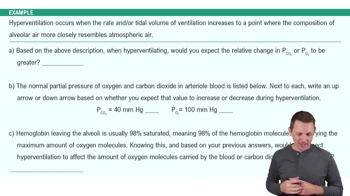Fill in the blanks: When the alveolar Po₂ decreases, the pulmonary arterioles_____. When the arteriolar Pco₂ increases, the bronchioles_______.
You and a friend are having a contest to see who can hold his or her breath the longest. Your friend hyperventilates before holding his breath, and subsequently wins the contest. Why did hyperventilation give him an advantage?
 Verified step by step guidance
Verified step by step guidance
Verified video answer for a similar problem:
Key Concepts
Hyperventilation

Carbon Dioxide and Breath Control

Physiological Effects of Breath Holding

If you swallow a large bite of food without properly chewing it first, you will feel discomfort during ventilation. Explain this, considering the arrangement of the trachea and the esophagus.
What happens to the metabolic rate of skeletal muscle tissue during exercise? What waste products are produced from metabolic reactions? How and why does this affect your rate of ventilation during exercise?
Predict what would happen to the tidal volume and inspiratory reserve volume if the phrenic nerves were severed. Which muscles would contract to try to compensate for this?
Which of the following statements about pulmonary ventilation is false?
a. Normal expiration requires the use of the expiratory muscles to decrease lung volume.
b. The inspiratory muscles increase lung volume, which decreases intrapulmonary pressure.
c. For inspiration to occur, intrapulmonary pressure must decrease below atmospheric pressure.
d. The intrapleural pressure is less than the intrapulmonary pressure; this prevents the lungs from collapsing during expiration.
Match each term with the correct definition
____Airway resistance
____Surface tension
____Surfactant
____Pulmonary compliance
____V/Q ratio
a. A detergent-like chemical secreted by bronchial smooth muscle that reduces surface tension
b. The matching of ventilation to perfusion
c. Largely determined by the diameter of the airways
d. Caused by the formation of hydrogen bonds between water molecules
e. Determined by the surface tension of the alveoli, the elastic tissue of the lungs, and the condition of the chest wall
